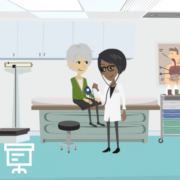Tips for Managing Your Oral Lung Cancer Treatment
Tips for Managing Your Oral Lung Cancer Treatment from Patient Empowerment Network on Vimeo.
What happens if you miss a dose of your oral therapy? Lung cancer expert Dr. Jyoti Patel shares advice for managing oral lung cancer treatment for optimal patient care.
Jyoti Patel, MD, is Medical Director of Thoracic Oncology and Assistant Director for Clinical Research at the Robert H. Lurie Comprehensive Cancer Center of Northwestern University. She is also Associate Vice-Chair for Clinical Research and a Professor in the Division of Hematology and Oncology at Northwestern University Feinberg School of Medicine. Dr. Patel is a leader in thoracic oncology, focusing her efforts on the development and evaluation of novel molecular markers and therapeutics in patients battling non-small cell lung cancer. Learn more about Dr. Patel.
See More from Thrive Lung Cancer
Related Resources:

|

|

|
Transcript:
Katherine:
Are some of the targeted therapies taken orally? And if so, are patients in charge of administering them, their own therapies?
Dr. Patel:
Many of the targeted therapies that are most effective are taken orally. And so, patients take them at home. Often, they’ll have once-daily dosing or twice-daily dosing. The number of pills often depends on the formulation of the drug. So, patients are responsible, I guess, for taking them. That comes with a lot. So, we need to think about, how do we help with adherence? How do we manage toxicity? How are the drugs affected by whether you eat or take the drug on an empty stomach? There are a lot of nuances there.
Generally, we like to give a lot of information to our patients. So, often, patients will meet with a pharmacist when they’re first prescribed the medication. They’ll meet with our nurses to go over how to take those and how to manage any side effects if they have them or what to do if there are any adverse reactions.
Katherine:
Mm-hmm. Well, what would happen if a patient forgets to take one of their medications? Does that impact its effectiveness? And then should they get in touch with their healthcare team to let them know?
Dr. Patel:
So, generally, we like patients to take the medication almost at the same time every day. We sort of think about half-life. So, we want to make sure that that serum level stays appropriate. If someone misses a dose – which happens – and, again the best-case scenario is that people are on these pills for years, right? For several years. So, of course, you’re going to miss a dose. If that happens, we generally tell people never to double up.
To let your team know. Often you can just skip that dose and take it in the evening or the next day.















